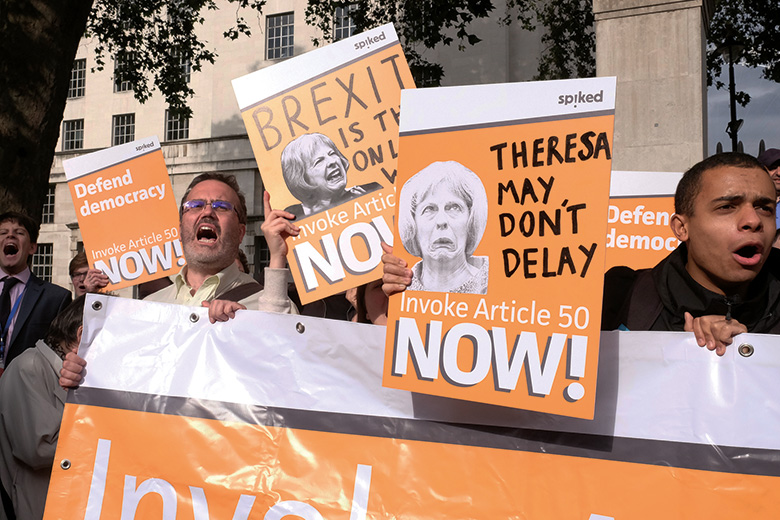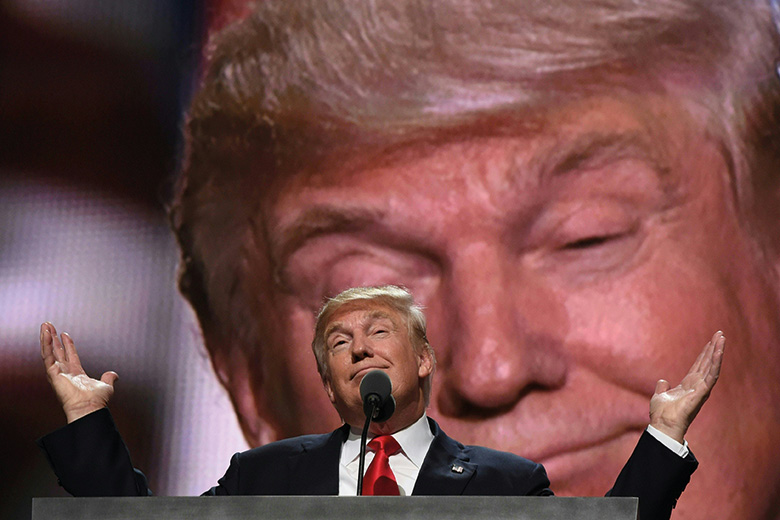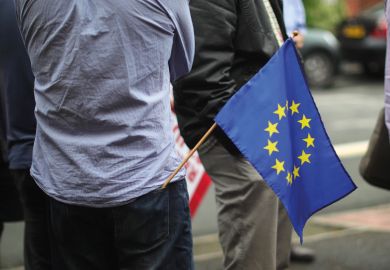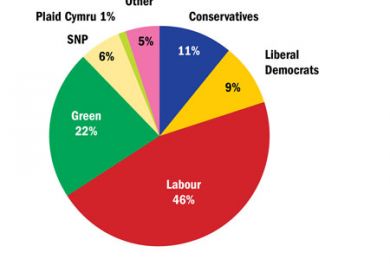Among the world’s most influential political and media figures prowling the backstage “spin alley” after the US presidential debate at Washington University in St Louis on 9 October was Nigel Farage.
The outgoing leader of the UK Independence Party sees Donald Trump’s bid for the White House and the victorious campaign for the UK to leave the European Union as being two manifestations of the same global movement. “I do not see the Brexit result in isolation,” he wrote in The Daily Telegraph, also on 9 October. “It is the same in the UK, America and much of the rest of Europe. The little people have had enough. They want change.”
The condescension in the phrase “the little people” might sound odd when it wafts from the mouth of a self-proclaimed scourge of elites. But Farage and Trump – who has described himself on Twitter as “MR BREXIT” – are clearly right to scent an international political movement on the rise.
This is the subject of a paper, “Trump, Brexit, and the rise of populism: economic have-nots and cultural backlash”, published in August by Ronald F. Inglehart, professor of political science at the University of Michigan, and Pippa Norris, Paul F. McGuire professor of comparative politics at the Harvard Kennedy School. They find that, across Europe, the share of seats gained by populist parties in national and European parliamentary elections has tripled since the 1960s, from 3.8 per cent to 12.8 per cent. As well as Ukip, those riding this wave include the Swiss People’s Party, the Austrian Freedom Party, the Swedish Democrats, Marine Le Pen’s Front National in France and Geert Wilders’ Freedom Party in the Netherlands.
Inglehart and Norris characterise populism as expressing “resentment of existing authorities, whether big business, big banks, multinational corporations, media pundits, elected politicians and government officials, intellectual elites and scientific experts, and the arrogant and privileged rich”. The sentiment favours “mono-culturalism over multiculturalism, national self-interest over international cooperation and development aid, closed borders over the free flow of peoples, ideas, labour and capital, and traditionalism over progressive and liberal social values”.
Western universities are generally cosmopolitan institutions that thrive on the international movement of researchers and students, and on the flow of ideas that movement can bring. “The rise of populism is a major challenge to institutions of higher education for many reasons,” Norris tells Times Higher Education. As well as potential curbs on international mobility, populism also poses “a direct threat to the university culture”, she adds.
That threat to “university culture” also appears to pose a threat to universities’ standing in wider society. Michael Gove, once the UK’s education secretary in the Conservative government, was the leading figure in the Vote Leave campaign in June’s EU referendum, alongside fellow University of Oxford graduate Boris Johnson. When challenged in a television interview about warnings by figures ranging from trade union leaders to economists about the potential economic impact of Brexit, Gove gave what is now an infamous response: “I think the people in this country have had enough of experts.”
Nor was this a throwaway remark, it appears. One report suggested that it was scripted by Daniel Hannan, Conservative MEP and Vote Leave campaigner. Gove followed up with a Times column in October, arguing that it was “those who scorned public opinion and asked us to trust the special expertise that only a background in international banking or academic economics can achieve” who brought us “the total failure to either predict, provide for or prevent the financial crisis”. Indeed, all populist parties use anti-expert rhetoric as one of their central tactics, argues Ruth Wodak, emeritus distinguished professor of discourse studies at Lancaster University and author of The Politics of Fear: What Right-Wing Populist Discourses Mean (2015), who is now leading a research project at the University of Vienna on the construction of Austrian identity.
As context, Wodak makes the point that many populist politicians have university degrees. Trump brands himself an anti-elitist while frequently referring to his degree from the Ivy League University of Pennsylvania. And the anti-immigration Alternative for Germany (AfD), which has some populist characteristics, was founded by a number of university professors.
Plenty of people with degrees, or who work in universities, will back populist parties, too. Wodak notes that the proportion of the Austrian electorate that supports the Austrian Freedom Party is now about 35 per cent, so clearly the party is appealing to “all strata of society”.
Nevertheless, she believes that populism’s twin characteristics of “anti-pluralism” and “anti-elitism” pose some particular challenges for universities. Their anti-elitist position allows populist parties to frame themselves as the ones who “present the voice of ‘the people’”, she says, and anti-expert rhetoric is an integral part of this stance. “They claim that ‘the people’ know what is right and wrong just intuitively…This appeal to common sense and against knowledge is very apparent and important in their ideology. I label that in my book ‘the arrogance of ignorance’,” she says.
Meanwhile, populists’ anti-pluralism sees them construct their definition of “the people” they speak for in a “very nationalist” way, Wodak says, which disadvantages migrants, including “knowledge migrants, who come from elsewhere to teach and study at universities…The anti-pluralist and anti-elitist stance of these parties implies that they would certainly challenge those institutions which convey knowledge, which are open and international – they [populists] would also say ‘cosmopolitan’, as a bad word. All of this does challenge the basic…humanistic tradition of universities.”
Austria is awaiting the rerun of its presidential election on 4 December, with former Green Party leader Alexander Van der Bellen – a retired professor of economics at the University of Vienna – standing against the Freedom Party’s Norbert Hofer. Van der Bellen won a narrow victory in the original May poll, but it was annulled after the Freedom Party claimed that ballot papers had been improperly handled. Hofer currently leads narrowly in opinion polls; he would be the first far-Right head of state in the EU if elected.
Wodak describes Austria as polarised “in a similar way to Britain…Universities are very strongly international. In all [Austrian] cities where universities are established there was a high [vote share] for the Green candidate. There’s a very strong stance of the intellectuals, of the universities, of academia against this populist ideology.”

The question is whether that stance by universities and intellectuals, if that is their only response, does anything other than cement the polarisation of politics and culture by reinforcing popular perceptions of them as out of touch and elitist.
There is no better example of the polarising role that university education can play in politics, and the consequences of such polarisation, than in the US. One recent poll found that Democrat presidential nominee Hillary Clinton was ahead among college-educated voters by 59 per cent to 34 per cent, while Trump led among those without a college education by 52 per cent to 42 per cent.
Other studies have also pointed to a fundamental difference between the politics of those who work in universities and the general public. Neil Gross, author of the 2013 book Why Are Professors Liberal and Why Do Conservatives Care?, has conducted a survey that found that about half of US college faculty described themselves as liberal, compared with one-fifth of all American adults. In The New York Times earlier this year, Gross wrote that “the most highly educated professionals are coming to form, if not a new class, at least a reliably liberal political grouping”. One factor in this, he argued, was “the perception that conservatives are anti-intellectual, hostile to science and at war with the university”.
Trump certainly has a consistent position of denying the existence of human-influenced climate change. During the first presidential debate on 26 September (at Hofstra University in New York State), he denied having described it as a Chinese hoax. But in 2012, he tweeted: “The concept of global warming was created by and for the Chinese in order to make US manufacturing non-competitive.” Moreover, according to The Washington Post, he has tweeted more than 100 times about global warming since 2009, almost always dismissing it as a hoax of some kind. And, in survey data published in October, the Pew Research Center found that “a large majority of Clinton supporters (70 per cent) say the Earth is warming mostly because of human activity, but just 22 per cent of Trump supporters share that view”.
But Trump did not establish a new position here – the politicisation and polarisation of responses to climate science has been well established for many years. “Political affiliation is one of the strongest correlates with individual uncertainty about climate change, not scientific knowledge,” wrote Andy Hoffman in a 2012 article, “Climate Science as Culture War”, published in the Stanford Social Innovation Review. (He has also written a book on the subject, called How Culture Shapes the Climate Change Debate.)
Is the perceived liberal-left slant of those who work in universities and science the reason that those on the Right are more likely to reject the idea of human-created climate change?
“That’s part of it. It’s not all of it,” Hoffman – Holcim professor of sustainable enterprise at the University of Michigan – tells THE. “There are many reasons why the quality of the debate over climate change, GMOs [genetically modified organisms], nanotech, nuclear power…is so distorted. One of them is that most academics don’t see it as their job to communicate their science to the public. That is dangerous to the future of the academy – to become irrelevant in these debates. Governments cut off funding; people distrust what they do.”
He suggests “changing the rules of academia”, creating training and incentives around communication of research, including via social media. But there is also the question of how scientists communicate on issues such as climate change. Ann Arbor, home of the University of Michigan, is seen as a “liberal bastion of craziness” by much of the rest of the state, Hoffman jokes. “If I were to parachute into a farm community in mid-Michigan and expect them to listen to me – it’s really not likely,” he admits. A better tactic would be to “communicate to their trusted messengers”, he thinks. “People want to hear it from people they trust. I want farmers to hear it from farmers…I want business people to hear it from business people.”
Part of the reason for increasing political polarisation, which applies internationally as much as within the US, is the changing, fragmenting nature of the media, Hoffman believes. “We no longer have just three [television] networks…We don’t have newspapers of record any more: people can get news from any source they want.” But while many of those new sources do not follow the rules of traditional, balanced journalism, this fragmentation is also an opportunity for academics to use the internet to “go straight at the public”.
Another potential tactic for universities is to reposition themselves as the voices of moderation. In other words, as the populists head off to extremes, some believe that US universities should move more towards the centre politically – or rightwards from where they currently are – in an attempt to “depolarise” their relationship to wider society.
Trump himself clearly associates universities with liberal views, as illustrated by an October campaign speech in which he complained that “in the past few decades, political correctness – oh, what a terrible term – has transformed our institutions of higher education from ones that fostered spirited debate to a place of extreme censorship, where students are silenced for the smallest of things. You say a word somewhat differently, and all of a sudden you’re criticised – sometimes viciously. We will end the political correctness and foster free and respectful dialogue.”
A detailed plan for ending political correctness was not forthcoming, and Trump’s own role in fostering respectful dialogue must surely be questioned. But his words show an attempt to characterise university campuses as places where practices around safe spaces and trigger warnings are rampant: places beyond the American political mainstream.
Sam Abrams, professor of politics at Sarah Lawrence College in New York State, is among those who set up Heterodox Academy, a group of academics aiming to increase political “viewpoint diversity” among faculty. He perceives a “meteoric” trend starting in the 1990s of “faculty turning hard Left, hard progressive”, such that they are now “completely at odds with the population as a whole in the United States. It is a huge problem, as they continue to really put themselves in a greater bubble, remov[ing] themselves from the political process.”
Abrams says that among the key strengths of the UK and the US are “our incredible education and university systems, which are the engines of growth and progress”. He argues that the politicisation of research and teaching is “slowing [that engine] down.”
In his eyes, changing faculty hiring practices would be a key step. He suggests that this is something that “boards of trustees and presidents could really push for”. But wouldn’t taking into account people’s political views when they apply for jobs be very sinister? “An explicit [political] litmus test is very dangerous and feels very McCarthyite,” Abrams admits. “On the other hand, [such tests] already exist: that’s the thing. It’s just very de facto rather than de jure, if you will. Because what you write, where you choose to publish it, what professors you want to work with…They are already…formal signals [of political affiliation].”

A clear gulf in political opinion between university staff and the wider public also exists in the UK. Ahead of the 2015 general election, THE ran a survey that revealed that 46 per cent of UK higher education staff were intending to vote Labour. Only 11 per cent were intending to vote Conservative and just four of the 1,019 respondents intended to vote for Ukip. Among the population as a whole, 30.4 per cent voted Labour, while 36.9 per cent voted Conservative, and 12.6 per cent voted for Ukip.
There was a similar pattern in the EU referendum. A THE poll before the vote found that 88.5 per cent of university staff intended to vote Remain and 9.5 per cent Leave. That was just a shade out of line with the actual UK result, which saw 48.1 per cent vote Remain and 51.9 per cent vote Leave.
The thinktank British Future’s report on the referendum result, Disbanding the Tribes, spells out that in most regions of the UK, the lowest votes for Leave came in towns and cities that have at least two universities, including in the East (Cambridge, where 26.2 per cent voted Leave), the North East (Newcastle, 49.3 per cent), the North West (Manchester, 39.6 per cent), the South East (Oxford, 29.7 per cent), the South West (Bristol, 38.3 per cent), and Yorkshire and Humberside (York, 42 per cent). In addition, Cardiff was the area with the lowest Leave vote in Wales and Edinburgh the lowest in Scotland.
Meanwhile, the British Election Study’s latest release of data on the referendum result, published in October, revealed that, “on average, Remain voters were likely to be younger, a graduate of a university, receiving a higher income and less likely to be white”.
Sunder Katwala, director of British Future, which looks at identity, integration and migration, was invited to address vice-chancellors at Universities UK’s annual conference earlier this year, in the wake of the Brexit vote. The mood was not a happy one – UUK had mounted a high-profile public campaign on what it saw as the benefits of EU membership for British higher education and wider society. Speaking to THE, Katwala says that there are clear explanations for the different political stances of graduates and non-graduates. The former are “much more likely to have a sense of autonomy and a sense of both economic and cultural confidence about [their] place in the world as the world changes”. Non-graduates are “less likely to be mobile” or to “think the benefits of globalness and mobility are likely to accrue to them”.
But while some in universities might want to assert the value of openness, Katwala also warns against a response that “repolarises” the debate instead of “depolarising” it. For him, “the big lesson of the referendum is you have to spread the material benefits of the economy and the benefits of being open to people who don’t feel they are part of it”. He sees “a very big opportunity for the universities here that they might risk missing” if they focus too narrowly on what leaving the EU “does to their position and worldview”. The referendum result, he believes, puts the spotlight on the “patchwork polarisation” between areas such as Norwich, which voted Remain, and the rest of Norfolk, which voted Leave. Universities, he says “have an active presence on the ground across the different regions that could actually be…incredibly important in securing consent and confidence for openness”.
They must be “seen to be doing the work of engaging, from Norwich to Norfolk” and spreading “a sense of opportunity and inclusion or ownership” of the university’s “international links” and ability to put “a region on the map”. “There aren’t that many…outposts of cosmopolitanism in the most Leave-voting areas that have the locus to do this…If universities don’t do it, it’s hard to see who else would,” he says.
In the view of Inglehart and Norris, it would be “a mistake to attribute the rise of populism directly to economic inequality alone” – although they do see this as one contributing factor. For them, the evidence points towards “the backlash against cultural change” in the form of rising cosmopolitanism and multiculturalism as the dominant factor. Either way, the consequences are potentially far-reaching. Even if they do not win places in government, populist parties “can still exert tremendous ‘blackmail’ pressure on mainstream parties, public discourse, and the policy agenda”, Inglehart and Norris write.
Most immediately, the rise of anti-immigration, Eurosceptic populism may threaten the very future of the EU, which would be hugely significant for universities given the likely repercussions for international mobility and financial support for both cross-border research collaborations and excellent individual researchers.
In the face of populism’s challenge to openness, Wodak believes that universities and academics should make the “positive argument…that innovation and [international] knowledge exchange are constitutive for new developments in respect of climate change [and] many [other] phenomena which the whole world has to cope with”. Knowledge and innovation also create new jobs and “actually relate to the everyday lives of everybody”, she adds.
Katwala’s argument suggests that these arguments might best be made on a micro-regional level.
At the recent Conservative Party conference, a raft of measures to limit immigration was announced, leading some commentators to accuse Theresa May, the new prime minister, of veering on to Ukip territory in the wake of the referendum result. The fact that the crackdown included new curbs on international student numbers will not have come as a major surprise to universities given May’s steadfast refusal, as home secretary, to remove international students from net migration figures. In her own conference speech, May said: “If you believe you are a citizen of the world, you’re a citizen of nowhere.” Given Katwala’s description of universities as “outposts of cosmopolitanism” and global citizenship, the potential for further clashes between universities and the prime minister is clear.
Perhaps it is time for the citizens of the world to unite and share ideas on how to respond to the new political climate – as researchers into populism such as Wodak and Norris are already doing. Yet, however universities approach the problem, they will clearly need to tread very carefully lest they portray themselves as part of the global elite resented by populist supporters. Otherwise, they will only intensify the risks to their funding, their culture and their educative missions.

Bursting the Georgetown bubble: it could still be Alt-Right on the night
The average Georgetowner – among whom there are any number of academics – laughs when I say that Donald Trump still could have the juice to win next week’s presidential election.
All those lurid allegations of molesting women whenever the mood seized him killed his campaign, they say – as evidenced by the many high-ranking members of his own party who have deserted him. The idea that he stands a chance of being elected the most powerful person in the world seems bonkers. Where am I, ask my fellow Georgetowners: in a parallel universe?
The answer could only be “yes”. What else is the US but a confederation of different “countries”, with preoccupations and obsessions that divide its citizens as they have always done? To occupy the mindset of the white, affluent, college-educated Georgetowner is to see the world distinctly from the impoverished Alabamans and Mississippians who, even now, remain loyal to Trump. The denizens of these picturesque, tree-lined Washington DC streets are emblematic of the hegemony by which Trump’s predominantly white voters feel betrayed and abandoned, and there is almost nothing that he can do to undermine their conviction that he is their saviour. That’s why his ratings in the polls are nowhere near as bad as you might expect.
What an extraordinary situation, when you consider how rapid was the descent of Democrat president-in-waiting Gary Hart, who in 1988 was merely alleged to have had an extramarital affair. There is no doubt that Trump has had numerous such relationships – they are part of his shtick. Yet none of this damages his standing among conservative evangelicals such as Jerry Falwell Jr. For many, Falwell – chancellor of Christian Liberty University in Virginia – is someone whose opinion counts. Even after the sexual assault allegations began to surface and the students of Liberty turned against Trump, Falwell insisted that he remained “best suited to lead our nation in a time of crisis”.
Trump’s pro-life stance, opposition to political correctness, hard line on immigration and probable intentions regarding future appointments to the Supreme Court account for much of this. Yet the most noteworthy aspect of this election is not how emphatically some evangelicals defend him but that those who have most to lose by his policies give him their support at all.
Academics will have been particularly chilled by the online video of Trump’s victory speech in the Nevada caucus earlier this year: “I love the poorly educated,” he crowed. This group was among those that had voted for him in large numbers, but the obscenity of Trump’s cheerleading for them was compounded by the fact that, were he to fulfil his promises to abolish the Department of Education and privatise the Federal Student Loans Program, the economically disadvantaged would be further than ever from the kind of private school and Ivy League education from which Trump himself benefited, thanks to his father’s wealth. Maybe he loves the poorly educated in the sense that he wants to swell their numbers.
Either way, a Trump victory would be bad news for universities in other ways too, given his evident disdain for their expertise in areas such as climate change. Universities’ political centres of gravity – firmly in the liberal camp – would also invite inevitable attacks in the wave of right-wing triumphalism that a Trump presidency would surely unleash (much as has happened in the UK with the press onslaught against “Bremoaners” in the wake of the EU referendum). Research funding levels could be at serious risk.
But it won’t happen, right? Probably not. But the truth is, no one knows for sure what will happen when the US goes to the polls next week. At the last of the presidential debates Trump revealed himself to be the hare-brained, ill‑tempered, bad-losing, fang-baring ignoramus of the best soap on American TV, making it hard even for an old pessimist like me to imagine he might win. All the same, I can’t help wondering whether the rural voters of the swing states are keeping their true inclinations to themselves. I’ll wait for the results before breaking open the Bollinger.
Duncan Wu is Raymond Wagner professor of literary studies at Georgetown University, Washington DC.
POSTSCRIPT:
Print headline: Polls apart
Register to continue
Why register?
- Registration is free and only takes a moment
- Once registered, you can read 3 articles a month
- Sign up for our newsletter
Subscribe
Or subscribe for unlimited access to:
- Unlimited access to news, views, insights & reviews
- Digital editions
- Digital access to THE’s university and college rankings analysis
Already registered or a current subscriber?







